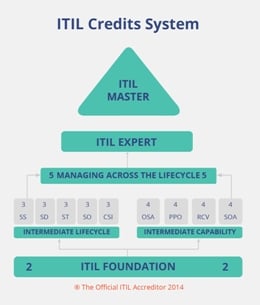
Information technology is evolving at a rapid pace in this digital age. For IT organizations, this advancement constantly creates new opportunities to deliver services that will contribute to business growth and customer satisfaction. In this scenario, IT service management (ITSM) has gained tremendous importance. As a practice, it covers the implementation and management of high-quality IT services that meet the needs of customers.
As an approach to facilitate and support ITSM, IT Infrastructure Library (or ITIL) is regarded as the most widely-accepted framework. The ITIL framework refers to a set of best practices to identify, plan, deliver and bolster IT services.
ITIL certifications have benefitted professionals around the world in their career progress and their job performance in ITSM roles. Starting with the entry-level ITIL Foundation, to ITIL Intermediate, ITIL Managing Across the Lifecycle, ITIL Expert, and ultimately ITIL Master, each level of certification offers you a more in-depth understanding of the ITSM framework.
To move up to the ITIL Expert level, certain credit requirements have to be satisfied at each prior level. However, the overlap of some subject areas also needs to be avoided. If you are looking to start building your ITIL knowledge base and get the benefits of globally-recognized certifications, take a look at what your credits journey will have to be.
The ITIL Credits System
The following credits are assigned to the different levels of ITIL certifications:
For certification levels higher than ITIL Foundation, the following credit values are needed:
| ITIL Certification Level | Credits |
| ITIL Foundation Certificate | 2 credits |
| ITIL Intermediate Service Lifecycle stream:
|
3 credits each |
| ITIL Intermediate Service Capability stream
|
4 credits each |
| ITIL Managing Across the Lifecycle (MALC) | 5 credits |
For Certification Levels Higher than ITIL Foundation, the Following Credit Values are Needed:
| ITIL Certification Level | Number of Credits Required | Composition of Credits |
| ITIL Foundation | None | None |
| ITIL Intermediate | 2 credits | 2 credits from ITIL Foundation |
| ITIL Managing Across the Lifecycle (MALC) | 17 credits | 2 credits from ITIL Foundation and a minimum of 15 credits from ITIL Intermediate or complementary qualifications |
| ITIL Expert | 22 credits | 2 credits from ITIL Foundation, a minimum of 15 credits from either ITIL Intermediate or complementary qualifications, and 5 credits from ITIL MALC |
Credits for Complementary Qualifications
You can blend ITIL qualifications with complementary qualifications to achieve the required number of credits for ITIL Expert. A maximum of 6 credits can be used from complementary qualifications to make up the required total.
The following is a list of endorsed complementary certifications and the credits attached to each:
Specialist Certificate in Business Relationship Management Specialist Certificate in Problem Management Specialist Certificate in Supplier Management Each holds
1.5 credits
| Name of Complementary Qualification | Number of Credits |
| Problem Analyst | 1.5 credits |
| Lean IT | 0.5 credits |
| ISO/IEC 20000 |
Foundation/Auditor Practitioner |
| Service Catalogue | 1.5 credits |
| IT Service Management Foundation based on ISO/IEC 20000 | 1.0 credits |
| Certified Process Design Engineer (CPDE) | 1.5 credits |
| BCS Specialist Qualifications: Specialist Certificate in Service Desk and Incident Management Specialist Certificate in Change Management | Specialist Certificate in Service Level Management |
| Configuration Management Database | 1.5 credits |
| Change Analyst | 1.5 credits |
| Sourcing Governance Foundation (SGF) | 1.0 credits |
| BiSL | 0.5 credits |
| ASL2 | 1.0 credits |
| ISO/IEC 27001 | 1.0 credits |
How to Plan ITIL Certification Credits without Overlaps
A well-balanced knowledge of ITIL is one of the essential requirements to attain the ITIL Expert certification. In its Credit Administration Policy, AXELOS recommends that certain modules with a moderate degree of overlapping content at the ITIL Intermediate level should be avoided.
These are:
- Service Design (SD) and Service Offerings and Agreements (SOA)
- Service Transition (ST) and Release, Control, and Validation (RCV)
- Service Operation (SO) and Operational Support and Analysis (OSA)
However, if you study for and pass these certification examinations, both sets of units can be counted in your make-up of 22 credits for ITIL Expert.
With the ITIL Expert certification in hand, you will be able to display a thorough understanding of ITIL to present and potential employers. The knowledge will be of immense benefit in building your ITSM career.















